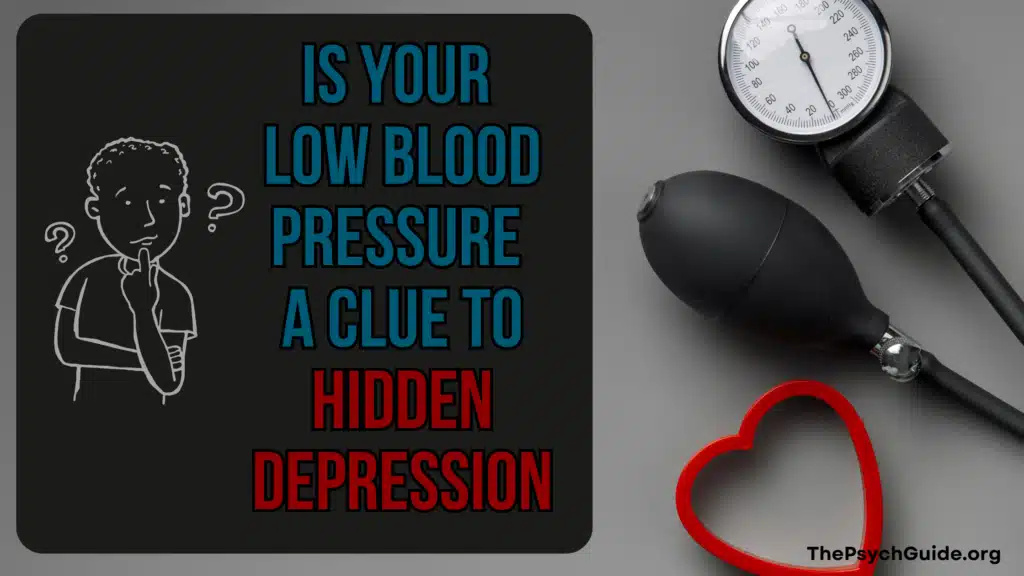We all know that feelings of fatigue and weakness can come with depression, but did you know it might be linked to something more than just emotional distress? When you’re struggling with depression, every part of your body can feel the impact, including your blood pressure. You might wonder, “Can depression cause low blood pressure?” This question is important because understanding the connection between mental health and physical symptoms can help us take better care of ourselves.
According to the World Health Organization, more than 264 million people worldwide experience depression, and it’s a leading cause of disability. On the other hand, low blood pressure, often not talked about as much as high blood pressure, affects a significant number of people. Even though they might seem different, these conditions could have a hidden link that changes how we think about how our bodies react to tough emotions.
Read with us to figure out: Can depression cause low blood pressure? and what you can do to manage both your mental and physical well-being.
Table of Contents
ToggleWhat is Low Blood Pressure?
Low blood pressure, or hypotension, occurs when the force of blood flowing through the arteries is too weak.
Typically, it’s when the top number (systolic) is below 90 mm Hg or the bottom number (diastolic) is below 60 mm Hg, although the exact values may vary depending on the individual and their health.
Here are some signs that someone might have low blood pressure:
- Blurry vision.
- Feeling confused.
- Getting dizzy.
- Fainting.
- Feeling like your head is light.
- Feeling sick to your stomach or throwing up.
- Feeling really tired.
- Feeling weak.
Blood pressure plays a crucial role in maintaining proper circulation and overall health. It represents the force with which blood is pumped by the heart and pushed through the arteries to reach every part of the body. This force ensures that oxygen and vital nutrients are delivered to tissues and organs.
Proper blood pressure helps maintain healthy blood flow, which is essential for cell function and overall well-being. When blood pressure is too high (hypertension) or too low (hypotension), it can strain the heart and lead to various health issues, including heart disease, stroke, or organ damage.
Therefore, maintaining a healthy blood pressure range is essential for optimal circulation and overall health.
Signs and Symptoms of Depression
- Persistent sadness.
- Lack of interest in activities.
- Changes in appetite or weight.
- Trouble sleeping or oversleeping.
- Fatigue or lack of energy.
- Feelings of worthlessness or guilt.
- Difficulty concentrating.
- Memory loss.
- Irritability or restlessness.
- Physical aches and head aches.
- Thoughts of death or suicide.
Can Depression Cause Low Blood Pressure?
For a long time, having low blood pressure was seen as a good thing for your health. However, new research has shown that there might be a connection between low blood pressure and depression. Let’s explore the question, “Can depression cause low blood pressure?” in the light of recent studies.
A 2009 research found that people with current depression had lower systolic blood pressure compared to healthy controls. Interestingly, the study also reported that people using certain antidepressants (tricyclic antidepressants and noradrenergic and serotonergic reuptake inhibitors) had higher blood pressure compared to those not using antidepressants. This suggests that while depression might be associated with lower blood pressure, certain antidepressants can raise it, making monitoring important.
On the other hand, an older study in 2000 by Davidson et al. suggests that young adults (23-35 years old) with higher depressive symptoms were more likely to develop high blood pressure (hypertension) over 5 years compared to those with lower depressive symptoms.
Contrary to this, a recent 2011 study by Hildrum et al. challenges the traditional view and found that people with higher levels of anxiety and depression (measured repeatedly over 22 years) had lower systolic and diastolic blood pressure compared to those with lower symptom levels. The association between depression/anxiety and lower blood pressure was stronger for those with consistently high symptoms throughout the study.
Overall, these studies highlight the complex interplay between physical and mental health. They suggest a possible link between low blood pressure and depression, but it doesn’t definitively prove depression causes low blood pressure. More research is needed to understand the mechanisms behind this link.
In conclusion, while the question “Can depression cause low blood pressure?” doesn’t have a straightforward answer, it is clear that our mental health significantly affects our physical well-being. Understanding this connection can help us manage both our mental and physical health more effectively.

How Depression Cause Hypotension
Depression can be associated with several factors that contribute to low blood pressure (hypotension):
- Depression often disrupts sleep patterns, leading to insomnia or excessive sleep. This sleep disturbance can affect the body’s ability to regulate blood pressure, potentially leading to low BP.
- Depressive symptoms can lead to changes in appetite, including reduced food intake. Poor nutrition resulting from these changes can contribute to low blood pressure.
- Depression can impact the autonomic nervous system, which controls involuntary functions like heart rate and blood pressure. Imbalances in this system may lead to blood pressure irregularities, including hypotension.
- Chronic stress, which is often associated with depression, can lead to the release of stress hormones like cortisol. Elevated cortisol levels can affect blood vessel function and contribute to low BP.
- Depression may alter blood vessel function, reducing their ability to constrict or dilate appropriately, which can affect blood pressure regulation.
- Ironically, some antidepressant medications, especially when first starting treatment, can cause a drop in blood pressure as a side effect. This can contribute to hypotension, but it’s crucial to work closely with a healthcare provider to monitor and adjust medications as needed.
- Depression can lead to a lack of motivation for self-care activities, including maintaining proper hydration. Dehydration can result in low blood pressure.
- Depressed individuals may become less physically active, which can lead to deconditioning of the cardiovascular system and lower overall blood pressure.
- Depression can cause significant weight fluctuations, with some individuals experiencing weight loss. This can result in decreased blood volume and contribute to hypotension.
Can Low Blood Pressure Make You Depressed?
Now that we’ve explored whether depression can cause low blood pressure, let’s consider the reverse: “Can low blood pressure cause depression?”
Research from 2007 suggests that people with low blood pressure (systolic or diastolic) were more likely to report symptoms of anxiety and depression compared to those with normal blood pressure.
A recent 2015 study further supported this by showing that individuals with low blood pressure experienced higher levels of depressive symptoms than those with normal blood pressure.
Furthermore, a 2018 Korean health survey of 10,708 participants found that low blood pressure is linked to a higher chance of suicidal thoughts (a symptom of depression) compared to normal blood pressure. This connection remained strong even after accounting for factors like age, gender, and health conditions. The study suggests that very low blood pressure is strongly associated with suicidal thoughts, indicating that low blood pressure can contribute to depression.
Low blood pressure can cause dizziness, fatigue, and weakness, which can severely impact quality of life, leading to feelings of frustration and helplessness that contribute to depression. Chronic low blood pressure can also affect brain function and mood stability due to reduced blood flow.
Additionally, managing a chronic condition like low blood pressure can increase stress and anxiety, potentially triggering depression. Thus, while low blood pressure may not directly cause depression, its symptoms and impacts can significantly contribute to it.
In conclusion, the relationship between depression and low blood pressure is bidirectional. Each can be a risk factor and can trigger the other, emphasizing the importance of understanding and managing both conditions to maintain overall well-being.
Other Causes of Low Blood Pressure
Low blood pressure (hypotension) can result from various factors and conditions other than depression. Here’s a brief explanation of some common causes:
- Dehydration: When your body doesn’t have enough fluid, it reduces the volume of blood, leading to lower blood pressure.
- Certain Medications: Some drugs, like antihypertensives (blood pressure-lowering medications) or diuretics (water pills), can cause blood pressure to drop.
- Heart Conditions: Conditions like bradycardia (slow heart rate) or problems with the heart valves can affect the heart’s ability to pump blood effectively, leading to low blood pressure.
- Endocrine Issues: Disorders of the endocrine system, such as thyroid problems or adrenal insufficiency, can disrupt the body’s hormonal balance and impact blood pressure regulation.
- Anemia: Anemia, characterized by a decrease in red blood cells, can reduce the blood’s oxygen-carrying capacity, potentially leading to low blood pressure.
- Pregnancy: During pregnancy, blood pressure can naturally decrease, especially in the early stages.
- Severe Infections: Conditions like sepsis or other severe infections can lead to low blood pressure due to the body’s response to inflammation and infection.
- Neurological Conditions: Certain neurological disorders may affect the autonomic nervous system, which controls blood pressure regulation.
How to Cope with Depression induced Low Blood Pressure
While depression and low blood pressure can be linked, it’s important to talk to your doctor for diagnosis and treatment. Here are some tips in the meantime that might help:
- Identify Stressors: Make a list of things that make you feel stressed or down. Talk to a therapist or counselor about ways to manage stress.
- Manage Stress: Practice relaxation techniques like deep breathing, meditation, or yoga to reduce stress. Make sure you get enough sleep to combat fatigue and maintain better health.
- Stay Hydrated: Drink plenty of water throughout the day. Dehydration can worsen low blood pressure. Aim for 6-8 glasses a day. If you’re active or sweating a lot, consider drinking electrolyte-rich beverages.
- Eat Small, Frequent Meals: Eating smaller meals more often can help keep your blood sugar stable, which can improve how you feel. Include a balanced diet containing fruits, vegetables, whole grains, and lean proteins.
- Increase Salt Intake: Ask your doctor if you should add more salt to your diet, as it can help raise blood pressure.
- Monitor Your Blood Pressure: Check your blood pressure at home regularly and during doctor visits. Keep a record to identify any patterns or triggers that cause low blood pressure.
- Wear Compression Stockings: Use compression stockings to improve blood circulation, reduce dizziness, and prevent blood from pooling in your legs.
- Exercise Regularly: Engage in moderate exercise like walking, swimming, or cycling to boost your overall health. Avoid sudden movements and get up slowly from sitting or lying down to prevent dizziness.
- Limit Alcohol: Reduce or avoid alcohol consumption, as it can lower blood pressure.
- Elevate Your Head While Sleeping: Raise the head of your bed slightly to help manage blood pressure levels during sleep.
- Social Connection: Spending time with loved ones, joining a support group, or volunteering can help combat feelings of isolation and boost mood.
Remember: These tips might help you feel better, but they are not a substitute for professional medical advice. Talk to your doctor about your symptoms and get a proper diagnosis and treatment plan.
Yoga to Avoid Low Blood Pressure
Practicing simple yoga poses for just a few minutes every day can help balance your body. Here are some recommended yoga poses for people with low blood pressure:
1. Uttanasana:
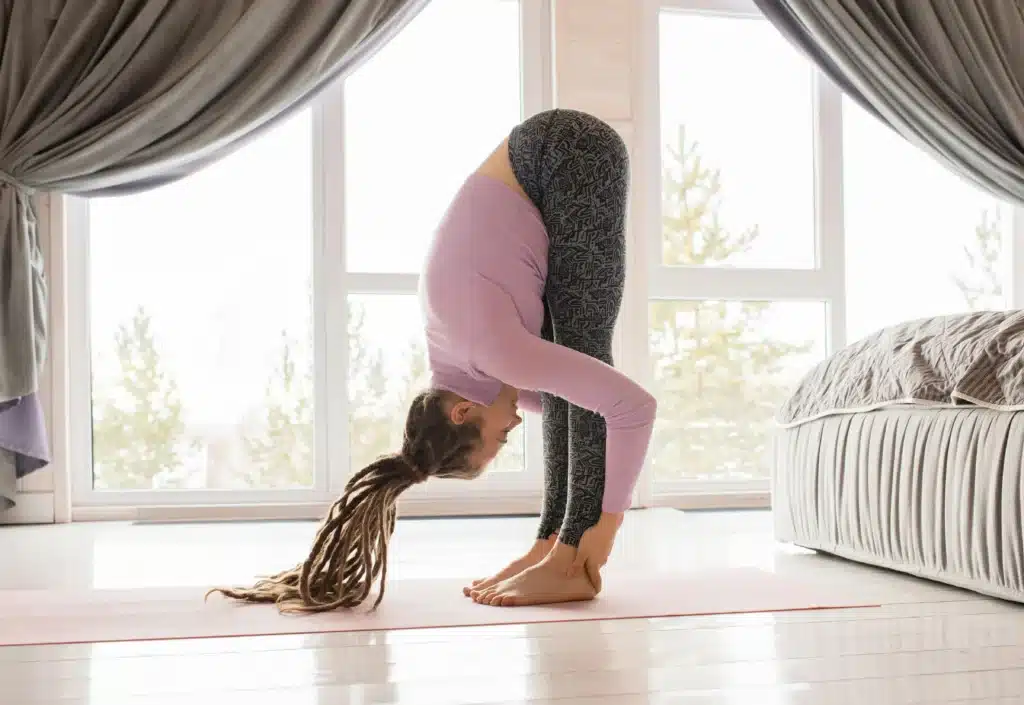
This pose improves blood flow to the brain, reducing feelings of tiredness and dizziness.
2. Matsyasana:

Stretching your neck and back muscles with this pose promotes even blood circulation and helps control blood pressure fluctuations.
3. Sarvangasana:
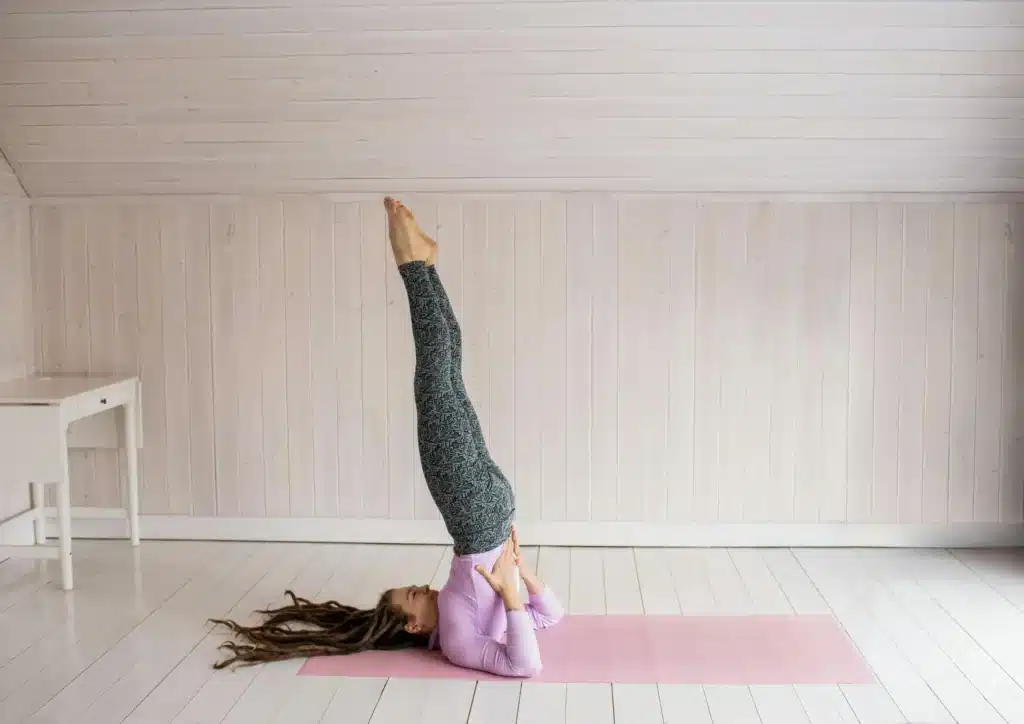
By enhancing blood flow to the brain, this pose minimizes dizziness and fatigue.
4. Shishuasana:
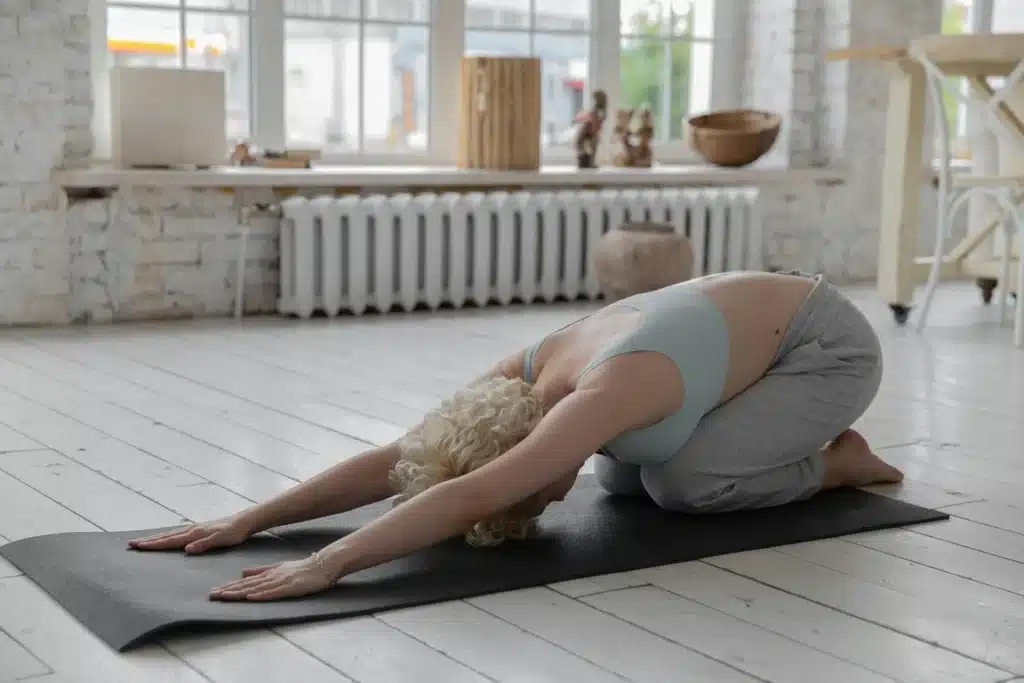
Stress and fatigue are eased, and the mind is soothed with this pose.
5. Adho Mukha Svanasana:
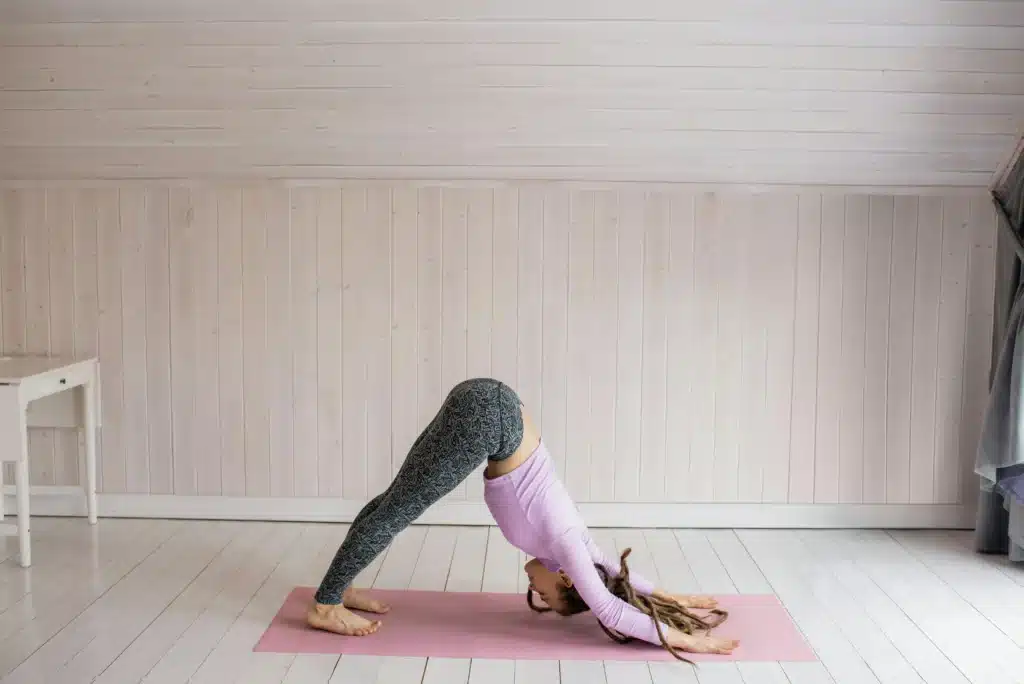
This pose calms the brain and relieves fatigue.
Exercises to avoid if you have low blood pressure
Individuals with low blood pressure can generally engage in a wide range of exercises and physical activities, but they should prioritize avoiding excessive strain. Here are exercises that should be avoided by those with low blood pressure:
1. Heavy Cycling
2. Zumba.
3. Jump Squats.
4. Exercise Sets Combining Sit-ups, Push-ups, and lunges
5. Walking When Experiencing Dizziness or Postural hypotension
While exercise can be beneficial for low blood pressure, it’s crucial to listen to your body and avoid activities that might lead to overexertion.
Conclusion!
In a nutshell, we’ve explored the question, Can depression cause low blood pressure? from different angles. It turns out that these two things are interconnected. Learning about this connection helps us understand more about how our bodies and feelings work together.
Studies showed that people depression may experience low bp and individuals with low blood pressure might be more likely to feel anxious, sad, or even have thoughts about suicide. This shows that there is a bidirectional connection between depression and low blood pressure.
The good news is that there are things we can do to help ourselves. Simple yoga poses and exercises can make our bodies and minds feel better. They can improve blood flow, make us feel relaxed, and even strengthen our hearts. But remember, it’s important to do the right exercises and talk to a doctor if you’re not sure.
In the end, understanding the link between depression, our body, and exercise can guide us towards a healthier and happier life.

